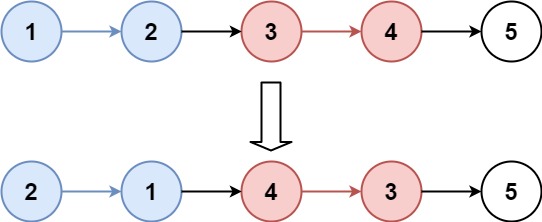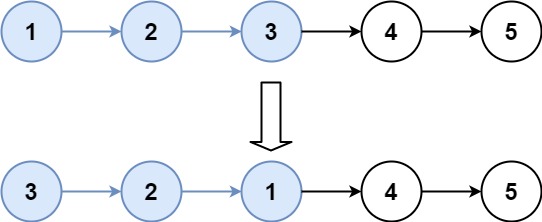25. Reverse Nodes in k-Group
Given a linked list, reverse the nodes of a linked list k at a time and return its modified list.
k is a positive integer and is less than or equal to the length of the linked list. If the number of nodes is not a multiple of k then left-out nodes, in the end, should remain as it is.
You may not alter the values in the list's nodes, only nodes themselves may be changed.
Example 1:

Input: head = [1,2,3,4,5], k = 2 Output: [2,1,4,3,5]
Example 2:

Input: head = [1,2,3,4,5], k = 3 Output: [3,2,1,4,5]
Example 3:
Input: head = [1,2,3,4,5], k = 1 Output: [1,2,3,4,5]
Example 4:
Input: head = [1], k = 1 Output: [1]
Constraints:
- The number of nodes in the list is in the range
sz. 1 <= sz <= 50000 <= Node.val <= 10001 <= k <= sz
Solution
/**
* Definition for singly-linked list.
* struct ListNode {
* int val;
* ListNode *next;
* ListNode() : val(0), next(nullptr) {}
* ListNode(int x) : val(x), next(nullptr) {}
* ListNode(int x, ListNode *next) : val(x), next(next) {}
* };
*/
class Solution
{
public:
bool count(ListNode *head, int k)
{
ListNode *temp = head;
int cnt = 0;
while (temp != NULL)
{
cnt++;
temp = temp->next;
}
cout << cnt << " ";
if (cnt >= k)
{
return true;
}
return false;
}
ListNode *reverseKGroup(ListNode *head, int k)
{
if (head == NULL || head->next == NULL)
{
return head;
}
ListNode *pre = NULL;
ListNode *curr = head;
int t = k;
ListNode *temp;
while (curr != NULL && t--)
{
temp = curr->next;
curr->next = pre;
pre = curr;
curr = temp;
}
if (temp != NULL)
{
if (count(temp, k))
{
head->next = reverseKGroup(curr, k);
}
else
{
head->next = curr;
}
}
return pre;
}
};



0 Comments
If you have any doubts/suggestion/any query or want to improve this article, you can comment down below and let me know. Will reply to you soon.